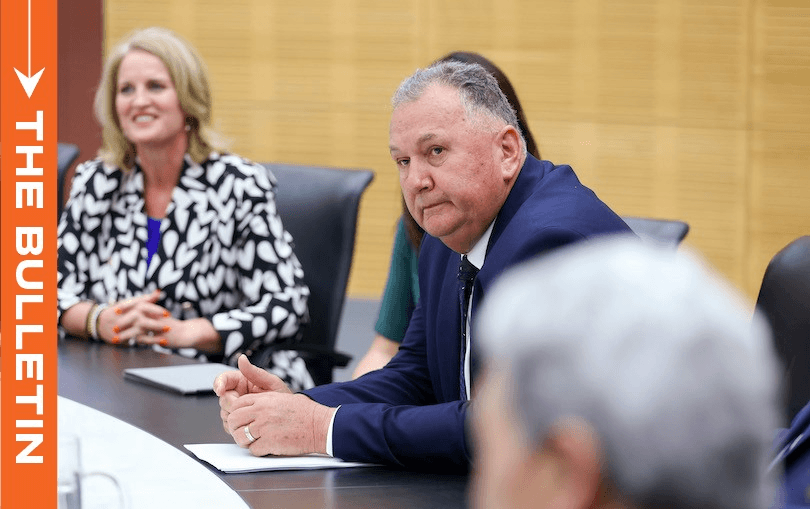The regional development minister is in Singapore as he says ‘beggars can’t be choosers’ about where we get support for new local projects, writes Stewart Sowman-Lund in today’s extract from The Bulletin.
To receive The Bulletin in full each weekday, sign up here.
Foreign investment in the regions
The regional development minister has headed to Singapore for a week long trip to meet with “potential investors, business leaders and policymakers”. It’s not unexpected for ministers to head overseas to try and lure influential people back into New Zealand, but the timing of the trip is notable given it’s about a week after both the government and Shane Jones’ own party, New Zealand First, doubled down on their plan to try and secure overseas investment in New Zealand.
“I want to hear about the opportunities investors and industry in Singapore are interested in exploring and share more about our work to develop a pipeline of investible infrastructure opportunities,” said Jones in a statement.
Searching for solutions
Jones holds several interconnected titles in the coalition – along with regional development minister, he’s also minister for resources and fisheries. He also wields a significant amount of power as one of the trio of ministers with oversight for the controversial fast-track legislation (though, remember, some of this control has been watered down in the face of opposition).
It’s of no surprise then that in this government and previous administrations, he has pitched himself as the so-called “prince of the provinces”. In a wide-ranging interview before the election with The Spinoff’s Duncan Greive, Jones described his identity as being “rooted in a rural existence and a regional existence”. Speaking to the NBR’s Brent Edwards ahead of his trip abroad (paywalled), Jones explained why he and his party has softened their historic hostility towards foreign investment – and how it will benefit rural New Zealand. “Let’s face it, beggars can’t be choosers,” he said. “We have a huge infrastructure deficit in New Zealand [and] we cannot fund it exclusively from taxpayer revenue.”
Of particular interest to Jones is the need to upscale our energy sector (Jones is also associate energy minister) and he will meet with several groups related to this area while in Singapore. Jones told the NBR he was keen to try and boost our geothermal capability, noting that it was “devilishly hard” to increase solar and wind power, while difficult to develop new sources of hydroelectricity. Jones recently told 1News there was a “tremendous future” for expanding our geothermal energy. “Wouldn’t it be great if we were the first nation in the world to draw from a new energy source — supercritical, deep-seated, infinite source of geothermal energy?” he said.
Creating opportunities at home
Back home, Jones remains committed to bolstering the regions and in an interview with the Herald’s Joseph Los’e described the need to govern not “purely for Khandallah or Kohimarama”. In the Ardern government, Jones was charged with doling out cash from the $3bn Provincial Growth Fund, which he said helped to boost economic outcomes. “Take the Te Tai Tokerau irrigation project. For Māori landowners, if you don’t have irrigation or water, the land is just an emotional heirloom,” he said. In the current coalition, Jones has a smaller $1.2bn pool for his rejigged Regional Infrastructure Fund. Applications for funding opened in July, while this year’s budget also confirmed $200m would go towards flood resilience infrastructure. The minister has been on a large regional tour as he works to promote his fund and call for applications. At a forestry summit in Gisborne last week, Jones described himself as a pro-growth and pro-industry politician.
National previously criticised Jones for effectively overseeing a “slush fund”, though infrastructure minister Chris Bishop said things are different this time around as the new fund would be “ministered well and diligently”, reported RNZ. In a report for his Politik website (paywalled), Richard Harman explained that the new fund focused on “investments rather than grants” and was primarily a “capital fund that provides funding through a mix of loan and equity investments”. Jones, speaking at a forum in Northland on the outskirts of Ngawha Prison, described his main “mission” as regional development minister was to “ensure that infrastructure, jobs, but most importantly investment, can proceed with a minimum amount of fuss so that we create opportunities where such facilities [prisons] over time don’t have such a high level of occupancy”.
‘A new lease of life’
Jones hasn’t gone about promoting the regions without attracting a fair amount of attention. As resources minister, Jones has unabashedly backed the reversal of the oil and gas exploration ban he previously endorsed while in government with Labour. “This is a multi-decade set of changes, but it’s better that we get ahead of the curve,” Jones said in 2018 when the ban was announced. He’s been leading the charge to reignite the mining sector, relishing the chance to speak to packed town halls, often while loudly retaliating against the protesters outside. As a minister with oversight for fast-track, he found himself in hot water over an undeclared meeting with a mining boss. In other words, Jone has been busy – both to the delight of his supporters and the fury of his detractors.
On the latest episode of The Spinoff’s politics podcast Gone by Lunchtime, co-host Ben Thomas described Jones as a “surprise” high performer in the current government. “Jones has never been known for his work rate,” said Thomas. “You generally don’t associate Shane Jones with sort of… really getting through the papers and the work, but he’s really had a new lease of life in this government.”
